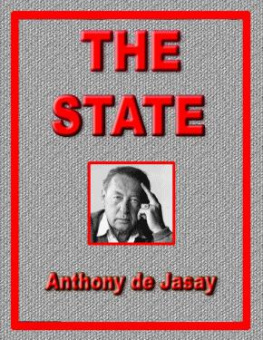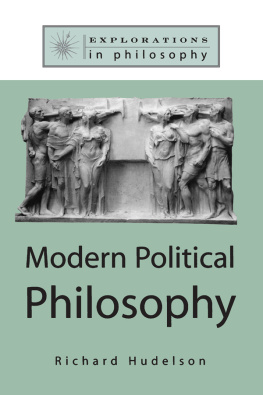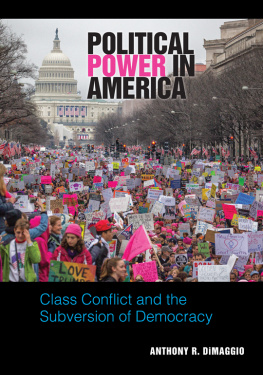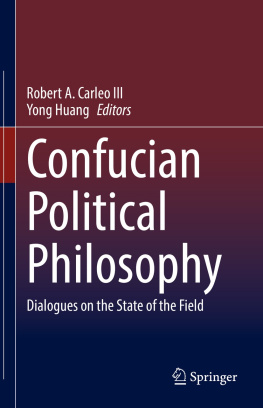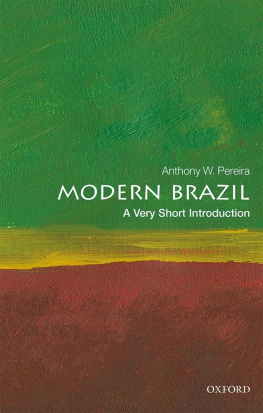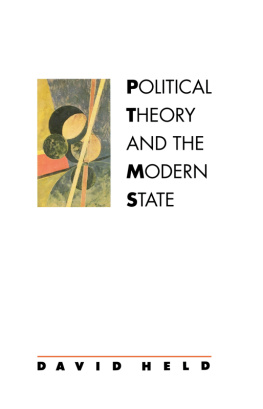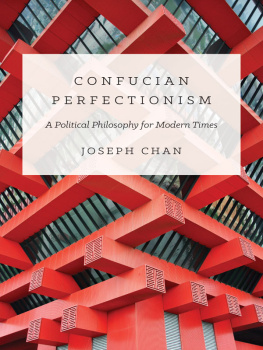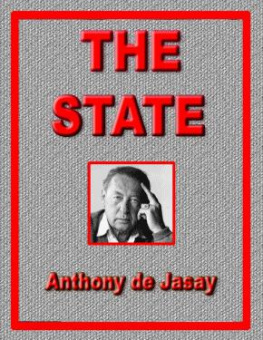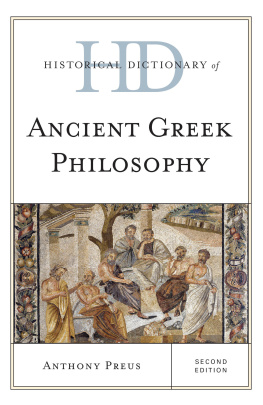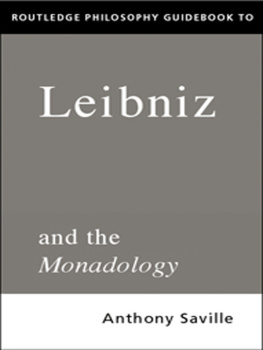Anthony De Jasay - The State
Here you can read online Anthony De Jasay - The State full text of the book (entire story) in english for free. Download pdf and epub, get meaning, cover and reviews about this ebook. year: 2009, publisher: Liberty Fund Inc., genre: Politics. Description of the work, (preface) as well as reviews are available. Best literature library LitArk.com created for fans of good reading and offers a wide selection of genres:
Romance novel
Science fiction
Adventure
Detective
Science
History
Home and family
Prose
Art
Politics
Computer
Non-fiction
Religion
Business
Children
Humor
Choose a favorite category and find really read worthwhile books. Enjoy immersion in the world of imagination, feel the emotions of the characters or learn something new for yourself, make an fascinating discovery.
- Book:The State
- Author:
- Publisher:Liberty Fund Inc.
- Genre:
- Year:2009
- Rating:5 / 5
- Favourites:Add to favourites
- Your mark:
- 100
- 1
- 2
- 3
- 4
- 5
The State: summary, description and annotation
We offer to read an annotation, description, summary or preface (depends on what the author of the book "The State" wrote himself). If you haven't found the necessary information about the book — write in the comments, we will try to find it.
The State — read online for free the complete book (whole text) full work
Below is the text of the book, divided by pages. System saving the place of the last page read, allows you to conveniently read the book "The State" online for free, without having to search again every time where you left off. Put a bookmark, and you can go to the page where you finished reading at any time.
Font size:
Interval:
Bookmark:
The State Anthony de Jasay
Preface Author's Note Introduction
- The Capitalist State
- Violence, Obedience, Preference
- Title and Contract
- The Contours of the Minimal State
- If States Did Not Exist, Should They Be Invented
- Inventing the State: The Social Contract
- Inventing the State: The Instrument of Class Rule
- Closing the Loop by False Consciousness
- The Adversary State
- Repression, Legitimacy and Consent
- Taking Sides
- Tinker's Licenc e
- The Revealed Preference of Governments
- Interpersonal Justice
- Unintended Effects of Producing Interpersonal Utility andJustic e
- Democratic Values
- Liberalism and Democracy
- Through Equality to Utility
- How Justice Overrides Contracts
- Egalitarianism as Prudence
- Love of Symmetry
- Envy
- Redistribution
- Fixed Constitutions
- Buying Consent
- Addictive Redistribution
- Rising Prices
- Churning
- Towards a Theory of the State
- State Capitalism
- What Is to Be Done
- The State as Class
- On the PlantationFootnotes (Chapters 1-3 ) Footnotes, continued (Chapters 4-5 )
Author: Jasay, Anthony de Title: The State Edition: 1998 Imprint: Indianapolis: Liberty Fund, Inc. First printed: 1985.
Anthony de Jasay
Advanced Search
Preface
Though this book leans on political philosophy, economics, and history, it leans on each lightly enough to remain accessible to the educated general reader, for whom it is mainly intended. Its central theme-how state and society interact to disappoint and render each other miserable-may concern a rather wide public among both governors and governed. Most of the arguments are straightforward enough not to require for their exposition the rigour and the technical apparatus that only academic audiences can be expected to endure, let alone to enjoy.
- If nothing else, the vastness of the subject and my somewhat unusual approach to it will ensure that specialist readers find many parts of the reasoning in need of elaboration, refinement, or refutation. This is all to the good, for even if I wanted to, I could not hide that my object has been neither to provide a definitive statement nor to solicit the widest possible agreement.
- The reader and I both owe a debt to I. M. D. Little for scrutinizing the major part of the original draft. It is not his fault if I persevered in some of my errors.
Paluel Seine Maritime France 1997
P.
Author's Note
The State is about the intrinsic nature of political power, constant in the face of changing contingencies, dictating the way forms of government evolve, rather than being dictated by them.
AN.1 The logic of using political power is the same as the logic of making choices in any other field of endeavour. Rational beings have objectives they seek to attain, and they deploy their available means in the way they think will maximize the attainment of these objectives. The state has a special kind of means: power over the conduct of its subjects that when exercised in particular ways is widely accepted as legitimate. Whatever may be its objectives-whether morally commendable or not, whether good for its subjects or not-the state can attain more of them fully if it has more power rather than less. In the rational-choice paradigm that underlies the more disciplined half of the social sciences, the consumer maximizes "satisfaction," the business undertaking maximizes "profit," and the state maximizes "power."
AN.2 Imputing to the state a rational mind and objectives it tries to maximize has attracted a measure of surprise, criticism, and even incomprehension since the first edition of The State. The approach was difficult to reconcile with the more conventional notions of the prince's holding power in trust, of modern government as the agent of a winning coalition within society, or of a pack of professional politicians serving particular interests in exchange for money, fun, and fame. It left no role for the social contract and no room for the common good. Above all, it treated the state, a web of institutions, as if it were a person with a mind.
AN.3 Arguing as if this were the case, however, produces a "simulation," a sort of schematic history whose power to explain and predict complex trends by tracing the work of simple and permanent causes may perhaps justify the break with conventional theory.
AN.4 The book predicts that by relentlessly expanding the collective at the expense of the private sphere the state-as-drudge always strives to become the state-as-totalitarian-master. The years since the book first appeared have witnessed one resounding failure of this attempt, the collapse of the socialist regimes in Russia and its satellites. It is hard to say what, if anything, this collapse disproves. Must the attempt always fail in the end? I see no persuasive reason why, in one form or another, it always should. Nor does it need to go all the way for corruption and the atrophy of social virtues to set in. May we hope, though, that forewarned is forearmed?
May 1997
AN.5
Introduction What would you do if you were the state?
- It is odd that political theory, at least since Machiavelli, has practically ceased asking this question. It has devoted much thought to what the individual subject, a class or the entire society can get out of the state, to the legitimacy of its commands and the rights the subject retains in the face of them. It has dealt with the obedience the hopeful users of the state's services owe it, the manner in which they participate in making it function and the redress the victims of its eventual malfunction can claim. These are vitally important matters; with the passage of time and the growth of the state relative to civil society, they are becoming steadily more important. Is it, however, sufficient to treat them only from the point of view of the subject, what he needs, wants, can and ought to do? Would not our understanding become more complete if we could also see them as they might look from the state's point of view?
- The present book is an attempt to do this. Braving the risks of confusing institutions with persons and the difficulties of passing from the prince to his government, it chooses to treat the state as if it were a real entity, as if it had a will and were capable of reasoned decisions about means to its ends. Hence it tries to explain the state's conduct towards us in terms of what it could be expected to do, in successive historical situations, if it rationally pursued ends that it can plausibly be supposed to have.
- The young Marx saw the state "opposing" and "overcoming" civil society. He spoke of the "general secular contradiction between the political state and civil society" and contended that "when the political state... comes violently into being out of civil society... [it] can and must proceed to the abolition of religion, to the destruction of religion; but only in the same way as it proceeds to the abolition of private property (by imposing a maximum, by confiscation, by progressive taxation) and the abolition of life (by the guillotine)."*1 In other isolated passages (notably in "The Holy Family" and the "Eighteenth Brumaire") he continued to represent the state as an autonomous entity, going its own way without, however, offering a theory of why this should result in "overcoming," "confiscation," "contradiction," why the autonomous state is an adversary of society.
- As Marx moved toward system-building, he fell in with the main body of political theory whose unifying feature is to regard the state as essentially an instrument. Thus, for the mature Marx, and more explicitly still for Engels, Lenin and the socialist thought they continue to inspire, the state became a tool, subservient to the interests of the ruling class and assuring its dominance.
Font size:
Interval:
Bookmark:
Similar books «The State»
Look at similar books to The State. We have selected literature similar in name and meaning in the hope of providing readers with more options to find new, interesting, not yet read works.
Discussion, reviews of the book The State and just readers' own opinions. Leave your comments, write what you think about the work, its meaning or the main characters. Specify what exactly you liked and what you didn't like, and why you think so.

